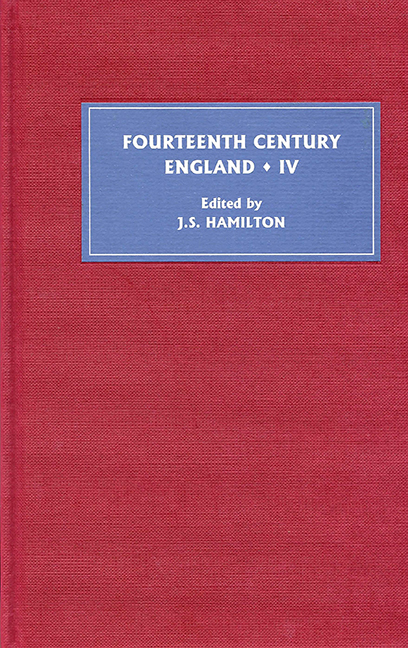Book contents
- Frontmatter
- Contents
- List of Illustrations
- Contributors
- Preface
- Abbreviations
- Who was St Thomas of Lancaster? New Manuscript Evidence
- ‘Hedging, Ditching and Other Improper Occupations’: Royal Landscapes and their Meaning under Edward II and Edward III
- Paying for the Wedding: Edward III as Fundraiser, 1332–3
- The Politics of Privilege: Thomas Hatfield and the Palatinate of Durham, 1345–81
- Agnes Maltravers (d. 1375) and her Husband John (d. 1364): Rebel Wives, Separate Lives, and Conjugal Visits in Later Medieval England
- Gendering Pastoral Care: John Mirk and his Instructions for Parish Priests
- Prosecution of the Statutes of Provisors and Premunire in the King's Bench, 1377–1394
- ‘Mercy and Truth Preserve the King’: Richard II's Use of the Royal Pardon in 1397 and 1398
- Aliens in the Pardons of Richard II
- ‘Too Flattering Sweet to be Substantial’? The Last Months of Thomas, Lord Despenser
- ‘O Prince, Desyre to be Honourable’: The Deposition of Richard II and Mirrors for Princes
- Regional Politics, Landed Society and the Coal Industry in North-East England, 1350–1430
Preface
Published online by Cambridge University Press: 12 September 2017
- Frontmatter
- Contents
- List of Illustrations
- Contributors
- Preface
- Abbreviations
- Who was St Thomas of Lancaster? New Manuscript Evidence
- ‘Hedging, Ditching and Other Improper Occupations’: Royal Landscapes and their Meaning under Edward II and Edward III
- Paying for the Wedding: Edward III as Fundraiser, 1332–3
- The Politics of Privilege: Thomas Hatfield and the Palatinate of Durham, 1345–81
- Agnes Maltravers (d. 1375) and her Husband John (d. 1364): Rebel Wives, Separate Lives, and Conjugal Visits in Later Medieval England
- Gendering Pastoral Care: John Mirk and his Instructions for Parish Priests
- Prosecution of the Statutes of Provisors and Premunire in the King's Bench, 1377–1394
- ‘Mercy and Truth Preserve the King’: Richard II's Use of the Royal Pardon in 1397 and 1398
- Aliens in the Pardons of Richard II
- ‘Too Flattering Sweet to be Substantial’? The Last Months of Thomas, Lord Despenser
- ‘O Prince, Desyre to be Honourable’: The Deposition of Richard II and Mirrors for Princes
- Regional Politics, Landed Society and the Coal Industry in North-East England, 1350–1430
Summary
Initiated in 2000 and now in its fourth volume, Fourteenth Century England has proved a success in fulfilling its purpose: to publish biennially a representative sample of recent and innovative work on the history of the fourteenth century, with particular emphasis on politics and the political culture of England. It is organised under the co-editorship of Nigel Saul (Royal Holloway, University of London), Chris Given-Wilson (University of St Andrews), Mark Ormrod (University of York) and Jeff Hamilton (Baylor University).
Fourteenth Century England is not the product of a specific conference, although it continues to derive some of its contributions from the sessions held annually at the International Congress on Medieval Studies, Western Michigan University, and the International Medieval Congress, University of Leeds. Certainly the sessions of the Society of the White Hart, founded by the late James L. Gillespie (in Kalamazoo), and the sessions of the Society for Fourteenth-Century Studies, organized by the editors of this journal (in Leeds), provide stimulating forums for the presentation and discussion of new research. Readers of this journal are encouraged to attend and participate in these meetings, although, again, contributions to the journal are in no way limited to participants of these, or other, conferences focusing on the fourteenth century.
Volume IV of Fourteenth Century England, like its predecessors, is not limited to a single theme, but rather represents the diversity of current scholarship, both in terms of subject and of methodology. John McQuillen, Alison McHardy, Beth Barr and Diane Martin are each concerned with the institutions and practice of religion, but the sources and methodological approaches they employ lead them to very different observations of the fourteenth-century experience. Amanda Richardson explores the relatively new field of landscape history, in the process demonstrating new applications for traditional types of documentary evidence. Biographical and prosopographical approaches are well represented in the articles by Alison McHardy, Christian Liddy, James Bothwell, John Leland and Martyn Lawrence. Another area that receives considerable attention in this volume is the application of the law. The use, or abuse, of the royal pardon in the reign of Richard is studied by both Helen Lacey and John Leland, while Diane Martin examines enforcement of the statutes of provisors and premunire in the same reign.
- Type
- Chapter
- Information
- Fourteenth Century England IV , pp. ix - xPublisher: Boydell & BrewerPrint publication year: 2006

